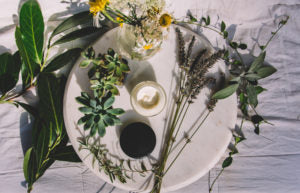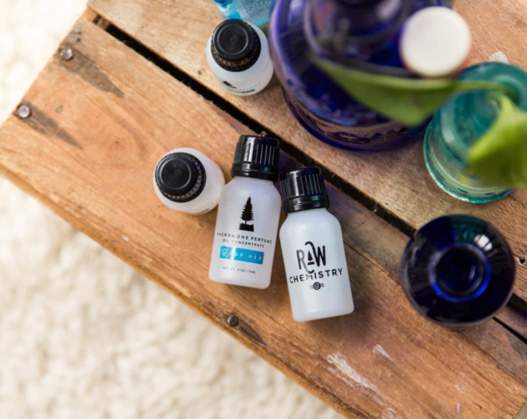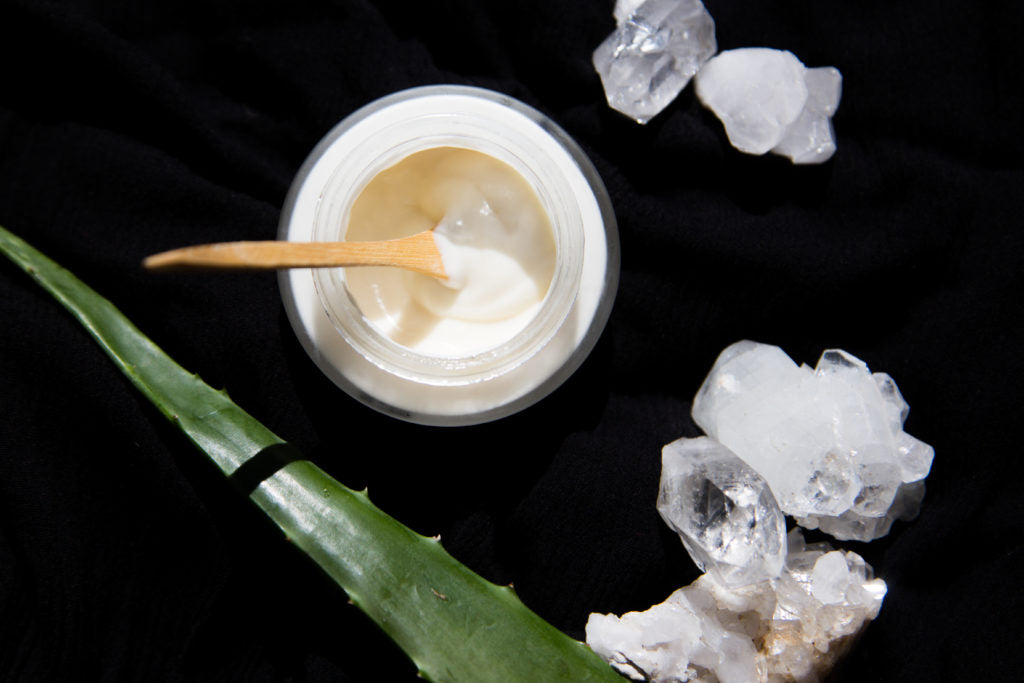
What Makes a Store-Bought Beauty Product Natural?
Curious about what chemicals and products go on and into your body, you find yourself asking more questions about daily choices, such as:
- So, What is natural skincare?
- Is this fruit organic?
- Should I avoid that chemical - is it a carcinogen?
Walking the aisles of a store, you seek products that are labeled organic and have a focus on wellness. It is fantastic to be so intentional with your shopping - that means you’re already ahead of the curve.
The trouble is - beauty product labels can be highly misleading.

Most people do not realize the truth - beauty brands can slap on labels far more easily than one would think. Yes, a lotion may have a sticker that says “all natural” but in truth...what does that really mean?
We’ll share precisely what - in a few moments.
Thankfully, there are telltale signs for how to spot what companies are delivering the best products that are actually natural - and what red flags there are to look out for.
We’ve created this guide to determine what is natural skincare, so you can confidently patrol the drugstore (and virtual) aisles for yourself. In a moment, we’ll breakdown:
- The startling truth about federal regulations - are there ANY in the beauty industry?
- The steps it takes for a company to get an “all natural” label
- What certifications matter...and which ones don’t mean much
- The easiest way to determine if a product is actually natural
First, you’ll want to know what level of regulation there is now - and what the label on that drugstore box actually means.
A startling truth: The FDA barely regulates beauty products
If we can share one nugget of information with you today, let it be this. Know that the FDA (Food and Drug Administration) barely regulates any companies in the beauty space.
Take this quote directly from the FDA website -
“With the exception of color additives and ingredients that are prohibited or restricted by FDA regulations, you may use any ingredient in your cosmetic, as long as it does not cause the product to be adulterated in any way.”
In other words, companies can put what they please into products -
Far more easily than most people would imagine. Why? The legalities are on the company. The FDA states that “You (the company) are legally responsible for making sure your cosmetics are safe and properly labeled.”
That is a frightening amount of trust to put into brands.
Brands, especially big, well-established companies, may take advantage of this FDA laxity. And truth be told, there are brands who DO take advantage of it.
That is why we want you to know these facts - before we get into the good news momentarily:
- The FDA does not have regulations specifying good manufacturing practices (GMP) for cosmetics. (Some companies, the ones truly committed to excellence, voluntarily put themselves through the process of getting GMP certified.)
- Companies do not have to register their beauty formulas with the FDA...it’s voluntary.
This information makes us question what’s in our medicine cabinets. Thankfully, the growth of the natural beauty industry gives you options as well, as long as you know how to find them.
From farmer’s markets to everyday stores
Not so long ago, people thought of “natural products” as things you found at the farmer’s market - discovered alongside homemade soap and fresh kale.
Thankfully, more people are understanding the benefits of organic, natural products - making vegan beauty items more and more mainstream.

The most recent Nielsen study backs this up.
From 2013 to 2017, natural products increased - taking up a sizably greater 1.4% more of the beauty market.
(1.4% industry growth may not sound like much...but in the beauty industry worth many billions of dollars per year? Even the tiniest part of a percent means a huge impact.)
The widespread movement for more natural products has grown in the last few years. The first step? Consumers starting to realize that healthy and clean eating is vital.
However, if we’re still slathering our faces and bodies with chemicals through our lotions, face washes and beauty products, that is still a serious wellness issue.
“Clean”, “Green”, “Organic”...What is Natural Skincare?
As companies launch “more natural” offerings...the lines have begun to blur. Due to limited regulation, it feels tricky knowing what products are truly good to your skin.
Who do you trust?
Here are some good starting points to know.
Natural - Natural is typically applied to products that are plant-based, but it doesn’t mean chemical-free or without pesticides
Clean - The term “clean” is often slapped on to address what a product does NOT contain...like certain chemicals or parabens. (It doesn’t mean the product is natural or organic.) Honestly, “clean” means something a bit different to each brand - as there’s no regulation.
Organic - This becomes a rather messy line. Qualifiers for organic food are far different than for beauty products. For example, it’s easy for companies to dub something organic - without much questioning from any regulatory agency
Be hesitant of the word “hypoallergenic”
If you see the label “hypoallergenic” on a product, know this means very little. Why? There is no regulation around the term. If one product has federal certification and the other has the label of “hypoallergenic”...you’ll want to select the former.
The best way to know if a skincare product is natural
A common fear is understanding labels - after all, how do we know what is good and healthy...and what is actually safe? (Thankfully, it is possible to find out.)
While labels can be misleading - there is a sure fire way to determine what is a natural skincare product - truly.
The best approach is to assess the ingredient list.

Because logos or terms like “all natural” are easy to include, reading ingredients is the very best way to determine how natural a product actually is.
Remember, many natural certification logos are shockingly easy to get.
Most of the time, the process is a brand signing a contract that states they’ll only use natural ingredients, paying a tremendous fee and then using the logo - that’s it.
In contrast, telling truthful ingredients is a whole other story.
You want to:
- Look for ingredients you can pronounce (the less scientific the name, the better!)
- You should be able to know what the ingredients are - such as being plant extracts, essential oils and common nutrients like vitamins
- Avoid harmful items like parabens, ingredients starting with “retin” (such as retinyl palmitate, retinoic acid) and sodium lauryl sulfate (which not only irritates the skin...it can encourage canker sores)
- Check out any products with “tiny beads”, often used for exfoliating. Why? If made from Polyethylene, know the beads are a synthetic chemical. Not only has the US government declared they can be a carcinogen...when released into waterways, these tiny pieces can collect pollutants and bring toxins to marine animals
See if the brand has these labels
There are certain labels and accreditations that are hard to get. The companies that get these labels not only have to work hard to ensure their products and manufacturing products pass “go” - A beauty brand taking the un-required effort to get certified shows character and true passion behind the company.
As for certifications go, there is a highest level of a GMP certified facility that beauty product creators can earn. This means the brand has put itself through rigorous tests at its own volition.
At RawChemistry, we are not only GMP certified...you can understand our ingredient list in each product. Read the back of this (truly natural) moisturizer - to see yourself.


